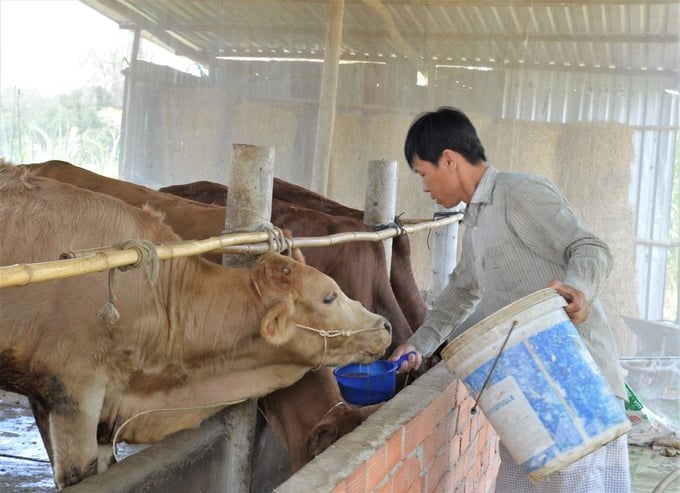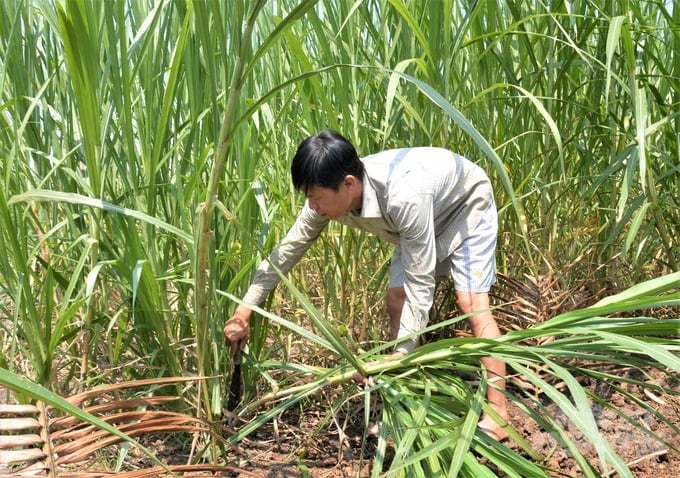May 20, 2025 | 00:39 GMT +7
May 20, 2025 | 00:39 GMT +7
Hotline: 0913.378.918
May 20, 2025 | 00:39 GMT +7
Hotline: 0913.378.918

Farmers take advantage of livestock waste to raise earthworms and compost organic fertilizer, helping to reduce costs in the next livestock chain. Photo: Trung Chanh.
In 2022, the Agricultural Extension and Agricultural Services Center of Hau Giang Province was allocated funding to implement the "Circular Agricultural Production Chain" model to help farmers develop economically and environmentally sustainable livelihoods. The deployment area includes seven units: Vi Thuy district, Chau Thanh district, Long My district, Phung Hiep district, Chau Thanh A district, Long My town, and Vi Thanh city.
Engineer Nguyen Hoang Chien, technical officer of the Agricultural Extension and Agricultural Services Center of Hau Giang Province in charge of the model, said: The "Circular Agricultural Production Chain" model includes many crop and livestock objects such as cow, goat, pig, fish, eel, frog, chicken, duck, earthworm, elephant grass, fruit tree, vegetable, ornamental plant, etc. Depending on conditions, participating households can choose suitable crops and livestock but must ensure a circular process, taking maximum advantage of waste and by-products as input raw materials for the next object.

Hau Giang farmers take advantage of organic fertilizer composted from livestock waste to grow and harvest grass as green food to serve livestock farming, creating a closed circular chain. Photo: Trung Chanh.
Accordingly, farmers take advantage of pig, cow, and goat manure to raise earthworms, compost biogas, and compost organic fertilizer; harvest earthworms as food for aquaculture and poultry farming and organic fertilizer for crops; utilize substandard fruits (jackfruit with black fibers) to feed goats and fish, etc. Thanks to that, it helps farmers save on input costs and lower production costs.
According to assessments, the "Circular Agricultural Production Chain" model is sustainable with a combination of input and output, taking advantage of waste as input raw materials to reduce production costs and prices and increase profits.
Specifically, the profit margin on the main object of cows reaches 16%, goats of approximately 29%, and pigs of over 42%. However, because cows are large animals and have a relatively long reproductive period, profits will be high from the third generation onwards.
Not only does it bring economic efficiency, but the circular agricultural production model also reduces pollution, better protects the environment, and ensures food safety and hygiene for products.
Translated by Thu Huyen
![Reducing emissions from rice fields: [Part 1] Farming clean rice together](https://t.ex-cdn.com/nongnghiepmoitruong.vn/608w/files/news/2025/05/05/z6509661417740_a647202949c539012a959e841c03e1d3-nongnghiep-143611.jpg)
(VAN) Growing clean rice helps reduce environmental pollution while increasing income, allowing farmers to feel secure in production and remain committed to their fields for the long term.
/2025/05/19/5136-1-144800_230.jpg)
(VAN) The Nghe An Provincial People's Committee has just approved the list of beneficiaries eligible for revenue from the Emission Reductions Payment Agreement (ERPA) in the North Central region for the year 2025.

(VAN) 14 out of 35 domesticated elephants in Dak Lak province have had their living conditions improved, with 11 of them currently participating in the non-riding elephant tourism model.

(VAN) Muong Nhe Nature Reserve hopes that being upgraded to a national park will lay the foundation for forest protection efforts to be carried out in a systematic, modern, and sustainable manner.
/2025/05/16/3923-2-171845_52.jpg)
(VAN) Lower costs, higher yields, and improved soil quality are outstanding benefits that soybeans bring when integrated into the crop rotation system.

(VAN) The 'For a Green National Environment' programme aims to promote a green lifestyle, support businesses in implementing ESG practices, and turn Net Zero commitments into concrete actions.

(VAN) Cold-barn systems efficiently manage environmental and temperature conditions, which aids in the prevention of respiratory diseases in pigs and protects them from the vectors that transmit African swine fevers.